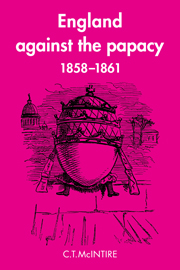 England Against the Papacy 1858–1861
England Against the Papacy 1858–1861 Book contents
- Frontmatter
- Contents
- Acknowledgments
- A note on the footnotes and abbreviations
- Maps
- Introduction
- 1 ‘English Liberties’ and ‘The Government of Priests’
- 2 Odo Russell and the network of English–papal relations
- 3 Tories, the pope, and peace
- 4 Tories, the pope, and war
- 5 Liberals and the revolution in the Romagna
- 6 Liberals, the congress and the Romagna
- 7 Liberals and the annexation of the Romagna
- 8 Liberals and the annexation of the Marches and Umbria
- Conclusion
- Select Bibliography
- Index
2 - Odo Russell and the network of English–papal relations
Published online by Cambridge University Press: 07 October 2011
- Frontmatter
- Contents
- Acknowledgments
- A note on the footnotes and abbreviations
- Maps
- Introduction
- 1 ‘English Liberties’ and ‘The Government of Priests’
- 2 Odo Russell and the network of English–papal relations
- 3 Tories, the pope, and peace
- 4 Tories, the pope, and war
- 5 Liberals and the revolution in the Romagna
- 6 Liberals, the congress and the Romagna
- 7 Liberals and the annexation of the Romagna
- 8 Liberals and the annexation of the Marches and Umbria
- Conclusion
- Select Bibliography
- Index
Summary
The English government's headlong entrance into Italian affairs and the Papal Question was, in the nature of the case, primarily a matter of diplomatic activity and international politics. In this way, Malmesbury began a new period of English involvement with the papal temporal power. The person on whom the English relied for their diplomatic relations with the pope was Odo Russell, a talented young envoy who arrived in Rome to take up his new appointment in December 1858, just as the international crisis was beginning. He ended up remaining in Rome until 1870 when the Italians took the city of Rome away from the pope. Odo Russell's position and activity in Rome during the political and diplomatic crisis of 1858 to 1861 were the centre of a complex configuration of relations – social, ecclesiastical, consular, diplomatic, naval and commercial – between the English and the papal temporal power.
English society in Rome
In Rome during these years there was a sizeable visiting population of English people residing annually in the city for ‘the season’. John Freeborn, the English consul in Rome at the start of 1859, reported that about 1500 British subjects visited Rome each year during the 1850s. They joined probably thousands of others who came from France, Austria, the German areas, and Scandinavia. In spite of the prospect of war, the 1859 season attracted the highest incursion of visitors of the decade, but as the papal crisis worsened, the numbers apparently dropped off considerably in 1860.
- Type
- Chapter
- Information
- England Against the Papacy 1858–1861Tories, Liberals and the Overthrow of Papal Temporal Power during the Italian Risorgimento, pp. 40 - 65Publisher: Cambridge University PressPrint publication year: 1983


